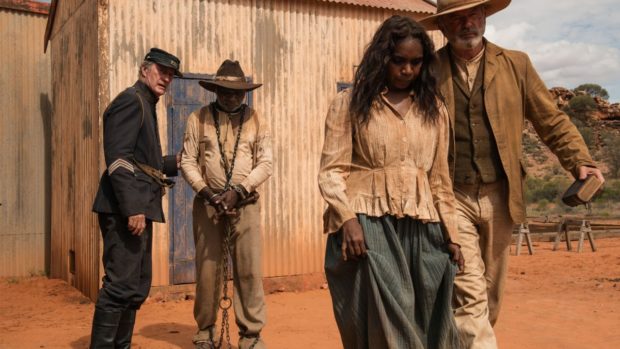
 Written and directed by native Australians, a new film provides a glimpse into the painful history of Australia’s brutal treatment of its original native population.
Written and directed by native Australians, a new film provides a glimpse into the painful history of Australia’s brutal treatment of its original native population.
Sweet Country is a tough, complex Australian film that provides a glimpse into the painful history of that nations’s brutal treatment of its original native population. Significantly, the movie was written and directed by native Australians—Steven McGregor and David Tranter wrote the screenplay and the director is Warwick Thornton.
The time is the early 1920s. The place is the desert land of the Northern Territory. The natives, usually referred to as blacks by the white Australians in the film, have a social position roughly analogous to that of African Americans during the Jim Crow era. They work for white ranchers, but they are generally treated as inferiors and, as we discover in the film, are vulnerable to all manner of abuse.
In the opening, a returning white World War I veteran named March visits rancher Fred Smith, played by Sam Neill, to ask for help setting up things on his nearby property. Smith can’t spare the time, but he lends him his ranch hand Sam Kelly, a native, for a few days. Sam takes his wife and daughter along with him, and then they discover that March is a mean racist drunk who treats Sam like a dog, and worst of all, while the husband is busy working, rapes the wife. She is of course told never to speak about it or else he’ll murder them all. And after the job is done, March borrows some native workers from another ranch, and through circumstances too involved to explain here, Sam Kelly ends up running away into the bush with his wife Lizzie. A posse goes in pursuit, led by an aging, ornery sergeant played by Bryan Brown.
Sam Neill and Bryan Brown are giants of Australian cinema. Brown is great as the intense, fanatically determined sergeant. Neill’s character Fred Smith is a kind of moral touchstone in the film—he’s a devout Christian who believes in equality, and he eats and prays together with Sam Kelly and his family. Tragically, it’s his agreeing to lend his ranch hand to March that starts the whole ordeal.
But at the center of this drama are the native actors. Hamilton Morris plays Sam Kelly, and he’s a strong stoic presence. There’s also the excellent Gibson John as another old ranch hand named Archie, proud but good at placating the white man. He’s an expert tracker who assists the posse trying to hunt Sam down.
Thornton, the director, lets the camera linger on the faces and demeanors of the native characters. They’re extremely reticent when questioned by their masters, and a lot is conveyed here about the inherent fear and caution that governs such people when faced with others who don’t believe that they have any rights or are worthy of any consideration. Thornton’s style allows for a deep sense of quiet that matches the stillness and awesome vistas of the outback. There is no musical score. At times during action or dialogue there are brief sequences that evoke past or future events in the story. In this way, Thornton hints at a sense of fatefulness and eternity surrounding the actions of these imperfect people.
The title Sweet Country, a phrase used by one of the white characters, is partly ironic. The country is sweet indeed, especially for those like Sam Kelly who are equipped by their tradition to survive its rigors, but its history is bitter. Sweet Country depicts a time of crisis and decision for Australia—to remain trapped in a legacy of enslavement and oppression or to somehow come to grips with its humanity. This challenge extends, as we know, not just to Australia, but to all of us on this earth.






